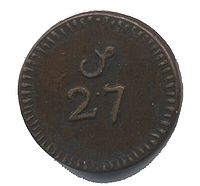- Moidore
-
A moidore is a Portuguese gold coin, minted from 1640 to 1732.
Contents
History
The name moidore is derived from Portuguese moeda de ouro, which literally means "golden coin".
Sphere of circulation
The moidore was current in western Europe and the West Indies, particularly Barbados, for a long period after it ceased to be struck. It was the principal coin current in Ireland at the beginning of the 18th century, and spread to the west of England.
Literary references
There is reference to the moidore in the John Masefield poem 'Cargoes' - 'Stately Spanish galleon coming from the Isthmus - Dipping through the tropics by the palm green shores, With a cargo of diamonds, emeralds, amythysts, topazes, and cinnamon, and gold moidores.'
There is also reference to the moidore in the book Gulliver's Travels by Jonathan Swift - 'He, who apprehended I could not live a month, was ready enough to part with me, and demanded a thousand pieces of gold, which were ordered him on the spot, each piece being about the bigness of eight hundred moidores...'
Additionally, there is at least one reference in Melville's Moby Dick: 'I have seen doubloons now before in my voyagings; your doubloons of old Spain; your doubloons of Peru, your doubloons of Chili, your doubloons of Bolivia, your doubloons of Popayan; with plenty of gold moidores and pistoles, and joes, and half joes, and quarter joes.'
Moidores are mentioned in the ninth chapter of Voltaire's Candide: '...My Lady has moidores and diamonds...'
Charles Lamb in the Essays of Elia says of Thomas Coventry that nor did he look or walk worth a moidore less. [1]
In Sir Arthur Conan Doyle's The Sign of the Four, Small wonders "how my folk would stare when they saw their ne'er-do-well coming back with his pockets full of gold moidores" when justifying his decision to help end Achmet's life for the treasure he carried.
References
- ^ Lamb, Charles Essay of Elia. London : Blackie & Son. p. 182
 This article incorporates text from a publication now in the public domain: Chisholm, Hugh, ed (1911). Encyclopædia Britannica (11th ed.). Cambridge University Press.
This article incorporates text from a publication now in the public domain: Chisholm, Hugh, ed (1911). Encyclopædia Britannica (11th ed.). Cambridge University Press.
Categories:- Gold coins
- History of Barbados
- Economic history of Portugal
- Coin stubs
- Portugal stubs
Wikimedia Foundation. 2010.

